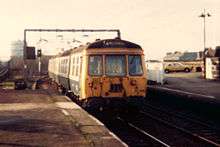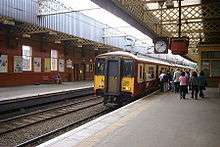Paisley Gilmour Street railway station
| Paisley Gilmour Street | |
|---|---|
| Scottish Gaelic: Sràid GhilleMhoire Phàislig | |
|
Paisley Gilmour Street from County Square | |
| Location | |
| Place | Paisley |
| Local authority | Renfrewshire |
| Coordinates | 55°50′51″N 4°25′27″W / 55.8474°N 4.4242°WCoordinates: 55°50′51″N 4°25′27″W / 55.8474°N 4.4242°W |
| Grid reference | NS482642 |
| Operations | |
| Station code | PYG |
| Managed by | Abellio ScotRail |
| Owned by | Network Rail |
| Number of platforms | 4 |
|
Live arrivals/departures, station information and onward connections from National Rail Enquiries | |
| Annual rail passenger usage* | |
| 2010/11 |
|
| 2011/12 |
|
| 2012/13 |
|
| 2013/14 |
|
| 2014/15 |
|
| Passenger Transport Executive | |
| PTE | SPT |
| History | |
| Original company | Glasgow, Paisley, Kilmarnock and Ayr Railway & Glasgow, Paisley and Greenock Railway |
| Pre-grouping | CR & G&SWR |
| Post-grouping | LMS |
| 14 July 1840 | Opened: 2 platforms and 2 lines[1] |
| 1880 | Expanded to 4 lines and 4 platforms |
| National Rail – UK railway stations | |
| * Annual estimated passenger usage based on sales of tickets in stated financial year(s) which end or originate at Paisley Gilmour Street from Office of Rail and Road statistics. Methodology may vary year on year. | |
|
| |
Paisley Gilmour Street railway station is the largest of the four stations serving the town of Paisley, Renfrewshire, Scotland (Gilmour Street, St. James, Paisley Canal and Hawkhead), and acts as the town's principal railway station. The station is managed by Abellio ScotRail and is on the Ayrshire Coast Line, 7 1⁄4 miles (11.7 km) west of Glasgow Central. The station is protected as a category B listed building.[2]
History
_RJD_57.jpg)
The station was opened on 14 July 1840 on the Glasgow, Paisley, Kilmarnock and Ayr Railway (GPK&AR).[1] The station was used jointly by the GPK&AR and the Glasgow, Paisley and Greenock Railway (GP&GR). However, the GP&GR did not run services until March 1841 due to construction difficulties at Bishopton.[3]
It was originally built with only two through platforms, with the GPK&R and the GP&GR lines separating to the west of the station. The station was later expanded to four platforms, two for the GPK&R and two for the GP&GR, with the lines separating to the east of the station.[4]
The section between Glasgow Bridge Street railway station and Paisley Gilmour Street station was a joint line: the Glasgow and Paisley Joint Railway.
Twentieth century
The station was electrified as part of the 1967 Inverclyde Line. Ayrshire Coast Line platforms (then numbered 1 and 2) were wired, however the wires finished a short distance west of the station. These were extended as part of the Ayrshire Line electrification by British Rail in 1986. This 1986 work coincided with the renumbering of the platforms with the Glasgow bound platforms numbered 1 (Inverclyde) and 3 (Ayrshire), and the outbound platforms numbers 2 (Inverclyde) and 4 (Ayrshire).
Following extensive works, Paisley Gilmour Street now has step-free access to all platforms, and the main access onto County Square, has been joined by a re-opened back access onto Back Sneddon Street. The access was originally built along with the station, but had closed and had been converted into a model shop for a number of years. Despite this conversion the shop retained the steps up to stations lower concourse, however it has been bricked up to prevent access. When the shop owner retired, it was decided to purchase the unit and convert it back as part of the step free access works for disabled people, as it would increase space within the station, and the works were fairly simple since the original stairs were retained. After re-opening it was signed as a dedicated exit to the station for those wishing to use the bus link to the airport, as the buses stop directly outside the door and the airport cycle route which passes outside.
A collision occurred between two trains at the eastern end of the station on Easter Monday 1979 which resulted in the deaths of seven people.
Operations

Paisley Gilmour Street is the busiest of the four Paisley stations. It has four platforms, with trains running on the Inverclyde and Ayrshire Coast lines. It is the fourth busiest railway station in Scotland, after Glasgow Central, Edinburgh Waverley, and Glasgow Queen Street.[5]
Connecting buses from this station also serve nearby Glasgow Airport (GLA) which is approximately 2 km away. It is possible to buy a railway ticket to and from the airport, which includes not only the train journey but also the journey on McGill's 757 service. The Glasgow Airport Rail Link would have replaced this bus service with a direct train, but the project was cancelled in September 2009 due to public spending cuts.[6] It is also possible to cycle from the station to the Airport using the Airport Cycle Route.
It is an important interchange, not only for the airport bus link, but also for many local buses which depart from the area surrounding the town centre running to destinations throughout the town of Paisley, Renfrew and to the out of town shopping centre, Braehead. It is expected that Braehead will get a dedicated bus link in the future, possibly utilising Hillington East.
British Transport Police
The British Transport Police (BTP) maintain a small office here but the main offices for the BTP is located 7 miles (11 km) away at Glasgow Central and 20 miles (32 km) south at Kilwinning.
Services

In the early 1980s up to the electrification of the AyrLine the station was served by:
- Glasgow - Ayr (DMU): 2 trains per hour (some extended to Girvan)
- Glasgow - Largs (DMU): 1 train per hour
- Glasgow - Gourock (EMU): 3 trains per hour
- Glasgow - Wemyss Bay (EMU): 1 train per hour
- Glasgow - Ardrossan Winton Pier (DMU): to connect with ferry to Brodick
- Glasgow - Stranraer Harbour (Loco hauled): to connect with ferry to Larne
2016

As of 2016 the station is served by:[7]
- Glasgow - Ayr (EMU): 2 trains per hour
- 3 trains per day continue from Glasgow to Edinburgh via Carstairs (2 on Saturdays)
- Glasgow - Largs (EMU): 1 train per hour
- Glasgow - Ardrossan Harbour (EMU): 1 train per hour (5 trains per day on Sundays)
- Glasgow - Gourock (EMU): 4 trains per hour (1 on Sundays)
- Glasgow - Wemyss Bay (EMU): 1 train per hour
| Preceding station | |
Following station | ||
|---|---|---|---|---|
| Johnstone | Abellio ScotRail Ayrshire Coast Line |
Glasgow Central | ||
| Paisley St James | Abellio ScotRail Inverclyde Line |
Hillington West | ||
| Historical railways | ||||
| Paisley St James | Caledonian Railway Glasgow, Paisley and Greenock Railway |
Connection with G&PJR | ||
| Connections with GP&GR and GPK&AR |
Caledonian and Glasgow & South Western Railways Glasgow and Paisley Joint Railway |
Cardonald | ||
| Elderslie Line open; station closed |
Glasgow and South Western Railway Glasgow, Paisley, Kilmarnock and Ayr Railway |
Connection with G&PJR | ||
Rail & Sea Connections
Northern Ireland
Trains connect Ayr along the Glasgow South Western Line to Stranraer where a bus link runs, route 350 operated by McLeans (except Sundays) to Cairnryan.[8] for onward ferries to the Port of Belfast by Stena Line and Larne Harbour by P&O Ferries.
Former connection closed in 2016: along the Ayrshire Coast Line to Troon for the P&O Ferries service to Larne Harbour.
Argyll and Bute
Trains run from Glasgow Central to Wemyss Bay station, connecting with Caledonian MacBrayne's service to Rothesay on the Isle of Bute and to Gourock, connecting with Argyll Ferries' service to Dunoon and various Caledonian MacBrayne emergency relief routes
Isle of Arran
Trains also connect along the Ayrshire Coast Line to Ardrossan Harbour for the Caledonian MacBrayne service to Brodick.
References
Notes
- 1 2 Butt (1995), page 180
- ↑ "Gilmour Street Railway Station: Listed Building Report". Historic Scotland. Retrieved 29 September 2011.
- ↑ Thomas (1971), page 155
- ↑ Thomas (1971), Page 52: has an 1888 photograph of the station with two through platforms; and the two lines separating to the west of the station.
- ↑ The usage information (Station Entries and Station Exits) is based on ticket sales in the financial year 2004/05 and covers all National Rail stations. Continued usage notes, and Excel format table for all stations available.
- ↑ "Ministers scrap airport rail plan". BBC News Online. 2009-09-17. Retrieved 2009-09-17.
Scottish Government has scrapped the £120m Glasgow Airport Rail Link amid public spending cut concerns.
- ↑ Table 219 & 221 National Rail timetable, May 2016
- ↑ http://www.dumgal.gov.uk/CHttpHandler.ashx?id=13006&p=0
Sources
- Butt, R. V. J. (1995). The Directory of Railway Stations: details every public and private passenger station, halt, platform and stopping place, past and present (1st ed.). Sparkford: Patrick Stephens Ltd. ISBN 1-8526-0508-1. OCLC 60251199.
- Jowett, Alan (March 1989). Jowett's Railway Atlas of Great Britain and Ireland: From Pre-Grouping to the Present Day (1st ed.). Sparkford: Patrick Stephens Ltd. ISBN 1-8526-0086-1. OCLC 22311137.
- Thomas, John (1971). A Regional History of the Railways of Great Britain. VI Scotland: The Lowlands and the Borders (1st ed.). Newton Abbot, Devon: David & Charles. ISBN 0-7153-5408-6. OCLC 16198685.
- Thomas, John; Paterson, Rev A. J. S. (1984). A Regional History of the Railways of Great Britain. VI Scotland: The Lowlands and the Borders (2nd ed.). Newton Abbott, Devon: David & Charles. ISBN 0-9465-3712-7. OCLC 12521072.
| Wikimedia Commons has media related to Paisley Gilmour Street railway station. |
